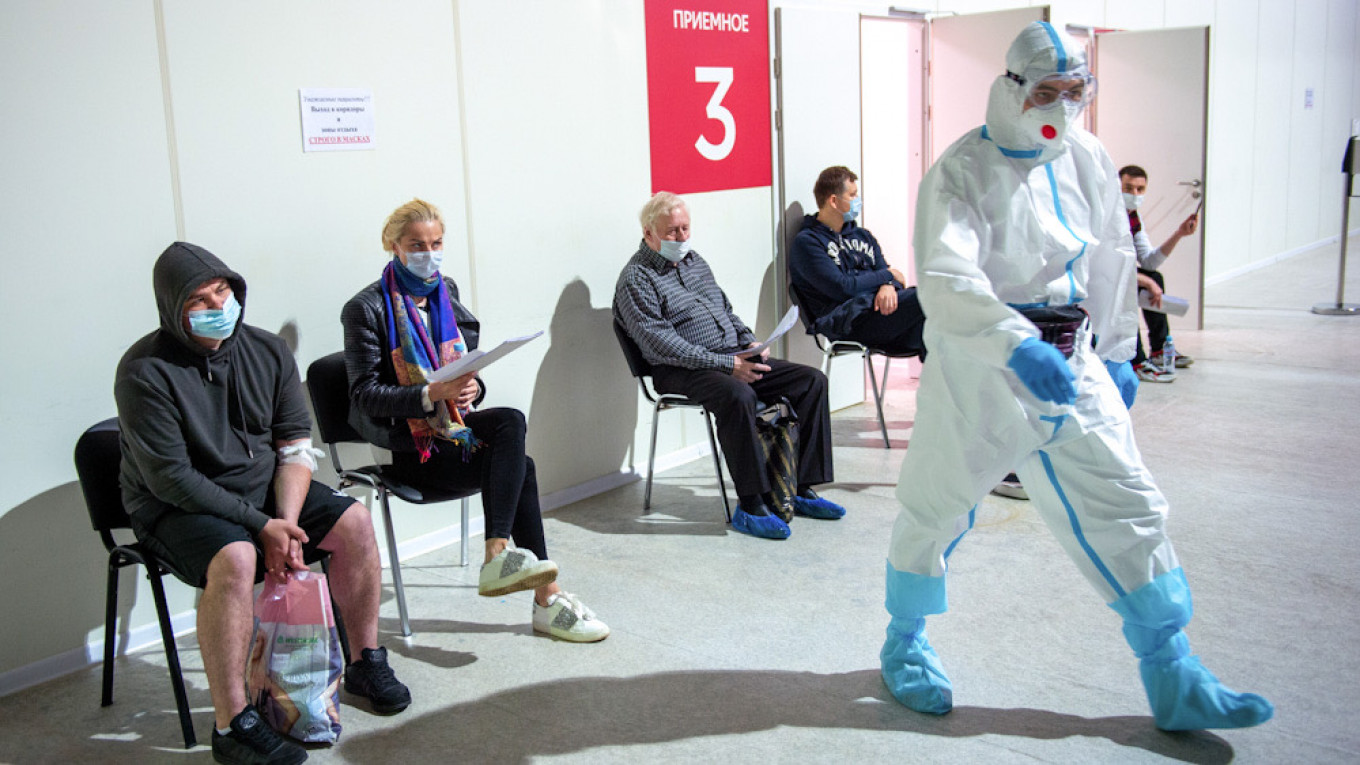Moscow is in the grip of the third major wave of the pandemic. This time, a new and more contagious strain of the virus that originated in India is spreading rapidly among Muscovites who had grown lackadaisical after several months of relative calm.
This is a good time to sum up the interim results of Russia’s battle against Covid-19. After crowing last year that it was the first country in the world to create a vaccine, frankly, Russia has failed on the vaccination front. Not only does it lag far behind small countries like Israel, that seems to have beaten the virus, but it also compares extremely poorly to large countries such as the U.S., Britain and Germany.
Both senior medical officials and President Vladimir Putin himself have publicly stated that 60% of the population must acquire Covid-19 antibodies to achieve herd immunity. However, only 10%-15% of Russians have them. It is possible that an additional 5% or so have immunity if they suffered only light cases of the virus that they hid from the authorities. This is especially likely in Russia’s regions.
But even then, only 20% of Russians would have immunity, a monstrously small figure and three times less than is necessary. This means Russia will suffer hundreds of thousands more deaths and many more years of the pandemic.
In fact, since December 2020, Russians have had access to various vaccines, and primarily the Sputnik V. They are administered free of charge at local polyclinics everywhere. But it turned out, that wasn’t enough to entice people to get vaccinated. So, the authorities opened vaccination centers in shopping malls and other high-traffic locations, but to no avail.
People simply don’t want to get vaccinated! Still, many have done so, including this author. Generally, the young and educated residents of Russia’s largest cities — the so-called “new middle class” — have been most willing to get the vaccine. They consider themselves world citizens, vacation in Berlin and Paris and watch Netflix and HBO. They don’t need to be convinced that vaccination is a good idea: they volunteer for it and talk their friends and co-workers into it as well.
The irony is that the segment of the population that stands most in opposition to Putin was the one that most eagerly sought out “Putin’s vaccine.” These educated, economically independent and globally minded youth are also the least enamored with authoritarianism.
Putin’s supporters, however, have not been getting vaccinated. These are the older Russians, generally less educated, who travel abroad only rarely, if at all.
This is not for want of trying on the part of Kremlin spin doctors. In fact, Russia’s propaganda machine has reached new heights in the past 10 years.
When Moscow leaders felt the need to tilt public opinion against Ukraine, they began spewing an unending torrent of invective against their erstwhile fraternal compatriots to the south. Even now, seven years after the events at Maidan, state-controlled political talk shows tell their viewers every single day how bad life is in Ukraine.
And that is only what happens on TV. On social networks, Kremlin propagandists utilize a well-established network of “troll factories” to churn out innumerable comments and counter-arguments according to definite guidelines, all of which act like a relentless swarm of gnats to irritate, distract and dilute the message of the opposition, popular bloggers and media outlets.
If the authorities had directed even one-half of that PR power towards the vaccination effort instead, maybe the situation would be very different today. But they didn’t. Why not?
The answer to this lies in the public’s reaction to the decision to introduce forced vaccination.
The failed vaccination campaign made it possible for the new strain of Covid-19 from India to gain a foothold in Moscow and spread. The Moscow authorities, therefore, declared a mandatory vaccination campaign, albeit with many exceptions. It isn’t required for 100% of the capital’s population. People with medical counter-indications are exempt, for example.
But it is mandatory for 60% of Muscovites, including service sector personnel working in cafés, stores, hair salons, etc.
This, of course, sparked a storm of indignation.
People who had said nothing when the authorities rigged election results, forced the courts to find innocent people guilty, shut down independent media outlets, jailed opposition members and tortured prisoners have finally started speaking out. “You are impinging on our freedoms,” they cried as the authorities came after them with a syringe.
They’ll shout for a time, but they’ll stop soon enough. Some will buckle and get the vaccine, but many more will turn to the already flourishing black market for a fake certificate of vaccination. The going price for such documents has already reached $200 in Moscow. And those same people will go home satisfied that they have outsmarted the system.
Then they’ll switch on a talk show about Ukraine and crank up the volume to drown out the noise of the ambulance come to take the elderly person next door to the Covid ward — and take comfort in the fact that no matter how bad things get here, the situation is always worse in Ukraine.
A Message from The Moscow Times:
Dear readers,
We are facing unprecedented challenges. Russia's Prosecutor General's Office has designated The Moscow Times as an "undesirable" organization, criminalizing our work and putting our staff at risk of prosecution. This follows our earlier unjust labeling as a "foreign agent."
These actions are direct attempts to silence independent journalism in Russia. The authorities claim our work "discredits the decisions of the Russian leadership." We see things differently: we strive to provide accurate, unbiased reporting on Russia.
We, the journalists of The Moscow Times, refuse to be silenced. But to continue our work, we need your help.
Your support, no matter how small, makes a world of difference. If you can, please support us monthly starting from just $2. It's quick to set up, and every contribution makes a significant impact.
By supporting The Moscow Times, you're defending open, independent journalism in the face of repression. Thank you for standing with us.
Remind me later.








